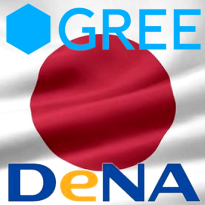 The monetization of social gaming is an uncharted and tricky endeavor, as Japan’s leading social gaming site Gree has just learned. On Tuesday, Gree CEO/founder Yoshikazu Tanaka announced the company would be keeping a more watchful eye on game content that some observers believe veers dangerously close to real-money gambling. At issue is a process known as “compugacha,” a compression of “complete gacha”, which describes how game players pay for virtual goods without knowing exactly which particular item they’ll receive via the exchange. It could be the final piece they need to assemble some larger tool that helps them succeed in the game environment, or it could be an item they already have and/or don’t need.
The monetization of social gaming is an uncharted and tricky endeavor, as Japan’s leading social gaming site Gree has just learned. On Tuesday, Gree CEO/founder Yoshikazu Tanaka announced the company would be keeping a more watchful eye on game content that some observers believe veers dangerously close to real-money gambling. At issue is a process known as “compugacha,” a compression of “complete gacha”, which describes how game players pay for virtual goods without knowing exactly which particular item they’ll receive via the exchange. It could be the final piece they need to assemble some larger tool that helps them succeed in the game environment, or it could be an item they already have and/or don’t need.
If that doesn’t immediately cause you to think gambling, the comparison grows stronger when the game involves turning over virtual cards. Turn over the right series of cards and you can claim other rare/valuable cards. Turn over the wrong cards and you get bupkis. These are the games that have attracted the attention of Japanese regulators, who are concerned that young Japanese gamers are being allowed to sit at virtual card tables. It’s estimated that Gree, which reported operating profits of 64b yen ($800m) last quarter, derives as much as 50% of its revenue from gacha. Gotcha…
Following an article in the Daily Yomiuri, which speculated that Japan’s Consumer Affairs Agency would order Gree and other social game publishers to rein in the gacha phenomenon, shares in both Gree and fellow gamers DeNA plunged between 20-25%. Gree’s Tanaka, often described as Japan’s Mark Zuckerberg, hastily assembled a press conference at which he declared that younger players would be subject to 5k yen ($63) spending caps, while older players would receive online warnings when their spending exceeded 10k yen. Reuters quoted Tanaka as saying he would work with other social game companies to draft industry guidelines by the end of this month. Clearly, Tanaka is determined to get out in front of this story, lest regulators kill his golden goose.





